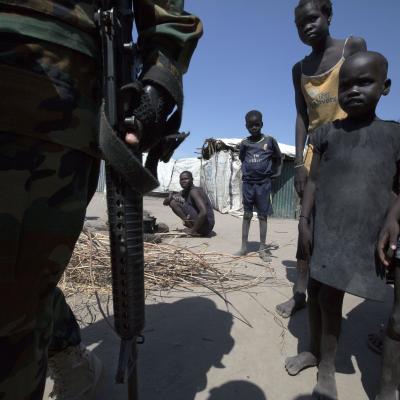At a recent debate at the European Commission's EuropeAid headquarters, Theodore Trefon, who is also a contributor and editor of the 2005 book, "Reinventing Order in the Congo", sparked a lively debate with his hard-hitting assessment of donor short-comings in Africa's largest nation.
In his 13 May presentation Mr Trefon said some donor interventions have hampered, rather than enhanced, DRC's efforts towards reform in the country's post-civil war period. Particularly damaging was the absence of harmonisation between major international donors who have failed to agree on a common plan of action while engaging in ideological, strategic and reporting rivalry that has generated a heavy bureaucracy for aid recipients.
"Despite the significant amounts of funding, the talent of the experts and even with the stated commitment of political leaders to embrace change, there is little tangible evidence of success in reconstructing state and society in the Congo," said Mr Trefon. "The result is an unmanageable political context and a series of fragmented and frequently contradictory actions."
Lack of ownership is a major flaw, said Mr Trefon. Donors have all too often imported solutions for local problems, often treating symptoms rather than dealing with the root causes of failings. For example, in the eastern Kivu region of the country, where fighting and unrest continue years after peace accords were signed in 2003, the international community maintains a huge and costly peace keeping force, but has failed to address the land tenure disputes that lie at the heart of the violence.
Donor approaches to project implementation can also lead to problems marginalising Congolese stakeholders, particularly in the identification and implementation phase of a project. Furthermore, the higher salaries offered by international donors is luring many civil servants away from their posts with damaging results.
"In DRC, qualified civil servants leave their administrations for better paid work in internationally funded projects, which leads to a counterproductive situation - instead of doing institutional building international donors are undermining it," said Mr Trefon.
Much donor money is wasted, according to Mr Trefon, as some donors see spending as a result in itself and fail to provide the necessary support and maintenance to projects once they've been set up.
"Projects are not cost efficient, not viable and locally inappropriate," said Mr Trefon. "Project success is evaluated in terms of amounts spent, rather than in results. Many reform and reconstruction strategies moreover are condemned by the absence of maintenance and follow-up policies."
There are failings on the Congolese side, too, as authorities lack the means to motivate their staff to implement directives.
"Absenteeism, privatisation of public work space, inadequate office material, recruitment strategies or the lack of satisfactory salaries are a few examples of factors that weaken the chain of command," said Mr Trefon.
According to Mr Trefon, Congolese civil society actors have so far been unable to effectively mediate between private sector operators, local populations, administrative authorities and international partners.
"The balance between the utopia of what is desirable," said Mr Trefon, "and the pragmatism of what is doable has not been struck."
RELATED READING
Donors have identified good principles for engagement in fragile states. These principles are available through the OECD website. See also the following related documents:
- Principles for Good International Engagement in Fragile States and Situations
- State Building in Situations of Fragility






Log in with your EU Login account to post or comment on the platform.